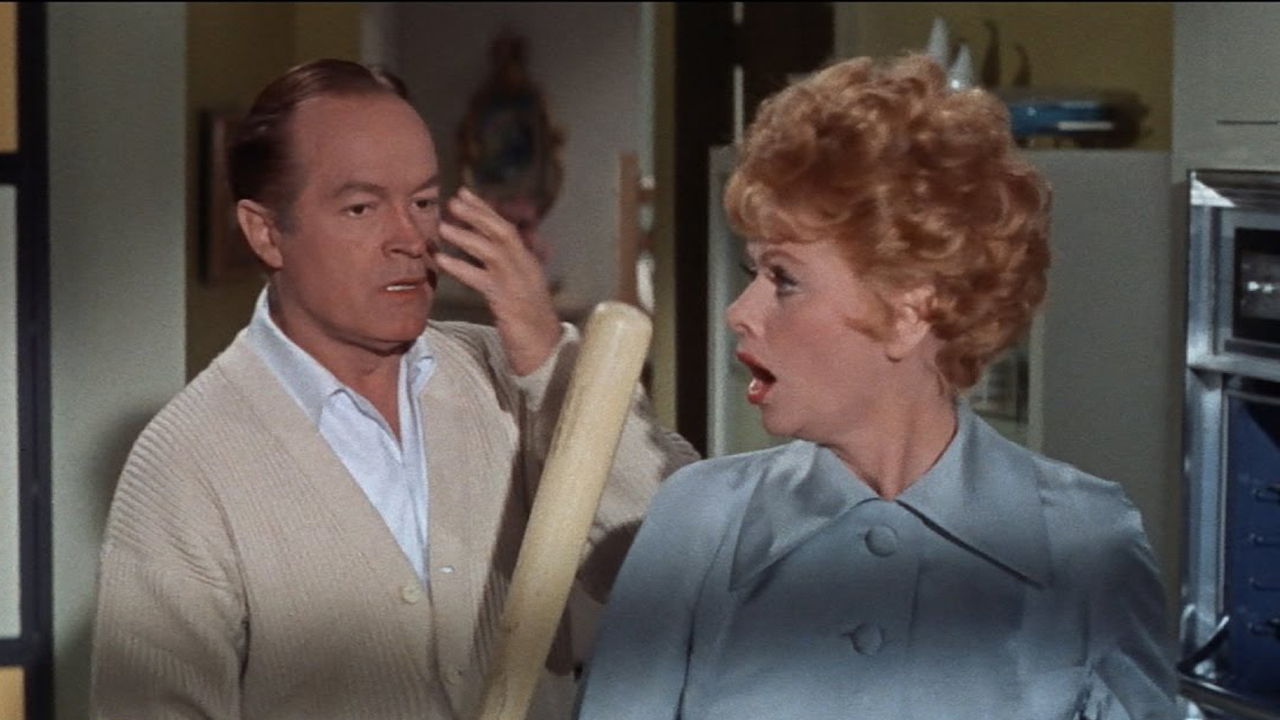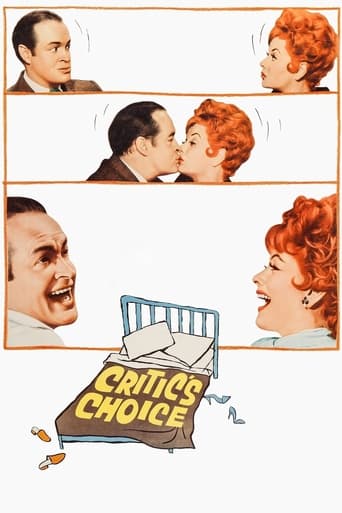



A Brilliant Conflict
It isn't all that great, actually. Really cheesy and very predicable of how certain scenes are gonna turn play out. However, I guess that's the charm of it all, because I would consider this one of my guilty pleasures.
View MoreThis is a dark and sometimes deeply uncomfortable drama
View MoreAll of these films share one commonality, that being a kind of emotional center that humanizes a cast of monsters.
View MoreThe decor alone is worth the price -- I want to live in Hope and Ball's apartment!Maybe it's because I saw it at such a young age, but it's always been a favorite of mine. Good dialogue, great cast, and just a lot of fun. (Years later I worked with Soupy Sales and told him how much I'd liked his cameo as a desk clerk. He told me that he'd had no idea he was going to do the movie until he got a call from Hope the morning of the shoot asking him, "Wanna come out to Burbank today and do bit with me?")And to those reviewers who complain that Hope's character "walks out" on the show he's reviewing at the top of the film, there were no such things then as "critic's previews." Nowadays critics attend a production during the final week or two of previews and write their reviews at leisure, to be published the day after the official opening night.Back then, all the critics attended on opening night, and it was standard operating procedure to leave the theater in time to make it back to the paper to file the review before the deadline. It's not meant to imply that the character doesn't take his job seriously or is a "bad critic" as others have written. The only thing that's inaccurate about that part of the film is that in reality, ALL the other drama critics from ALL the other daily papers would have been "walking out" at the exact same moment to make the exact same deadline.
View MoreThis movie seems to have sparked an almost even mixture of highly favorable and downright negative reviews. I'm afraid I agree with the negative brigade. After the box office disaster of "Beau James" (1957) in which Hope invested his own money and literally lost his shirt, he seems to have taken any assignment that came along. (Personally, I thought "Beau James" was an absolutely terrific movie. I loved it, but hardly anyone agrees with me). Anyway, for whatever reason, I think most of us would agree that Bob Hope made some very poor films in the 1960s, starting with the verbose but unfunny "The Facts of Life"; continuing with "Bachelor in Paradise" (which starts amusingly, but the promise of its sprightly opening scenes is unfortunately not realized); recovers a lot of momentum with "Road to Hong Kong" (even though it's one of the least amusing of the "Road" pictures); then really plumbs the depths with "Critic's Choice". For me, it's a movie with no virtues at all. The characters are not just unsympathetic, they're thoroughly unpleasant. As a result, everything they do and say is negative. Maybe it worked well on the stage, where the audience is less involved, less close to the venal, utterly selfish, self-promoting characters. Maybe?
View MoreMention the name Lucille Ball, and what comes to mind for most of us is the zany character in the long-running 1950s TV comedy show, "I Love Lucy." But, I wonder if Lucy started out with a wish to be a comedienne, or if she had her eyes on any other fields of stage or screen. Comedy was part of her early roles, but she also had roles in which she sang and danced ("Dance, Girl, Dance" of 1940). And there can be no doubt about her acting ability from such dramatic and suspense films as "Valley of the Sun" and "The Big Street" in 1942; or "The Dark Corner" in 1946; or "Lured" in 1947. On the other hand, there's little doubt about Bob Hope's aspirations. From his earliest days in vaudeville, Hope was a comedian, and he would always be a comedian. For all his kidding aside about earning as Oscar, Bob knew that he had little chance because Oscar very rarely went to a comedian. He even made his overt desire for an Oscar a part of his long- running comedy routines, and it was sure to get a laugh decade after decade That doesn't mean that Bob Hope didn't do some very funny movies. But his type of humor wasn't the subtle, clever or zany type that usually involved great or very good acting. Clark Gable, James Stewart, Carole Lombard and Claudette Colbert were some of the very accomplished dramatic actors who could do Oscar-winning caliber comedy in movies. Bob's comedy forte was the one-liner. Or, make that, a string of one- liners, one after the other. And in that, he often aroused some great laughter. So, that brings us to this movie, "Critic's Choice." This film is meant to be a semi-serious movie about Broadway and a critic's life, with a comedic outlook. And Lucy plays a serious character, a "straight man" to Bob's wisecracks and one-liners. I think it was intended as a light comedy to begin with, sans any zaniness on Lucy's part. The very funny parts are in the last half with Bob. He has some zany scenes himself, and a few strings of one-liners that bring out loud laughter. Some examples are: "This is the drunkenest room I've ever been in." "This apartment's all uphill." And, "I'd just like to be there when we get where I'm going." "Critic's Choice" is a nice film for an evening of light entertainment, and worth watching just to see two of the great comics of all time together.
View MoreBroadway theatre critic Bob Hope (as Parker Ballantine) is known for his stinging reviews of bad plays. When beautiful red-haired wife Lucille Ball (as Angela "Angie " Ballantine) decides to become a playwright, Mr. Hope decides he will be completely objective in reviewing her work. Hope doesn't like the first draft and refuses to help Ms. Ball during re-writes and run-throughs. Ball is encouraged by a producer's interest and works closely with younger director Rip Torn (as Dion Kapakos); a romance, or the potential for one, develops. Meanwhile, Hope is perused by still-interested first wife Marilyn Maxwell (as Ivy London)...With all the re-writes, it's odd nobody re-wrote "Critic's Choice"...Hope's character is unlikable, and he's not a competent reviewer; he walks out of the opening play, which the audience enjoys, and declares it bad. Hope writes a review of Ball's play even though he was too drunk to see anything. Hope should have helped Ball and excused himself from reviewing her play. The relationship between Ball and Mr. Torn is confusing. Little Ricky Kelman (as John) should have been Ball's son; in the original play, the character "Angela" was too old to have a 12-year-old son. By the way, young Kelman and older Jessie Royce Landis (as Charlotte "Charlie" Orr) do well in supporting the legendary co-stars.**** Critic's Choice (4/3/63) Don Weis ~ Bob Hope, Lucille Ball, Ricky Kelman, Rip Torn
View More